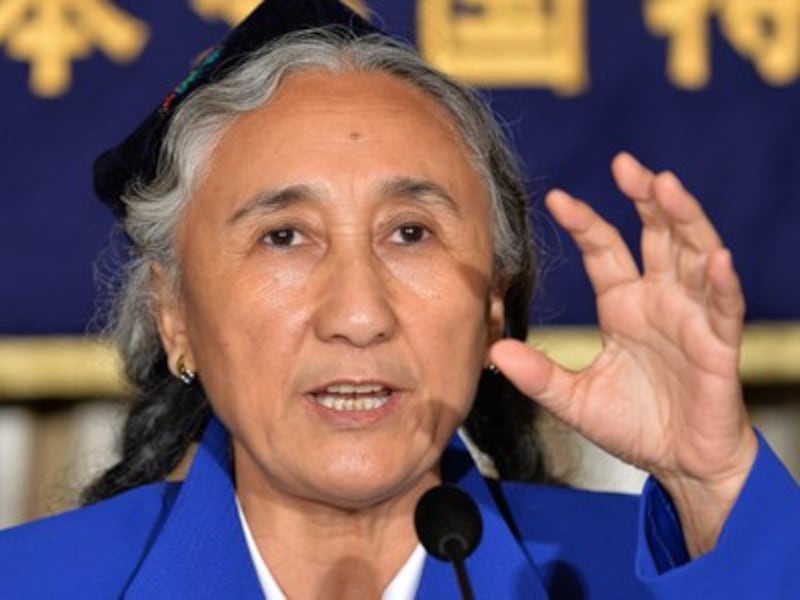Some notable civil rights activists known to be a thorn in side of the People’s Republic of China blamed Beijing’s influence for visa troubles that kept them out of Taiwan for an international conference on religious freedom this week.
Blind legal activist Chen Guangcheng, World Uyghur Congress President Rebiya Kadeer and Uyghur activist Dolkun Isa were forced to miss the first Asia-Pacific Religious Freedom Forum because they couldn’t legally enter Taiwan.
Chen Guangcheng, who now lives in the U.S., said he was invited by the forum’s organizers, but did not get a visa from Taiwan, a self-ruled democracy over which authoritarian Beijing claims sovereignty.
"If we don't put the universal value of human rights in the right position, but continue to ignore it, we will spoil the dictators so they will not abide the law," he told RFA’s Cantonese service.
Rebiya Kadeer told RFA's Uyghur Service that she believed she was excluded as a result of pressure from Beijing, which wants to keep the Taiwanese in the dark about the treatment of her people.
"China did not want its severe human rights religious abuses against people of East Turkestan, and the reality of how they are suppressing the Uyghur people for all kinds of reasons, to be publicized in Taiwan, so they pushed Taiwanese government not to give us a visa," she said. Kadeer currently lives in the U.S.
"It would have been a great opportunity for me to meet Taiwanese people, and the Asia-Pacific Religious Freedom Forum would have been a great stage for me to show the reality of Uyghurs right at the moment, such as how Uyghurs are migrating to other countries because of the religious repression against them," she added, using the Uyghurs' preferred name for their region, which China calls Xinjiang.
In a statement to the forum, World Uyghur Congress Executive Secretary Dolkun Isa said he was “disheartened when I learned that my inability to take part in the forum was likely because of pressure from the Chinese government on the Taiwanese.”
The forum is jointly hosted by several groups in the U.S. and Taiwan and is chaired by former Republic of China Vice President Annette Lu. The ROC is Taiwan’s official name.
“I believe that any discussion taking place around religious freedom must focus some attention on the treatment of Muslims in China, Uyghurs living in East Turkestan in particular, as the issue is too often overlooked,” Isa said.
While the independence-leaning Democratic Progressive Party (DPP) decisively defeated the pro-China Kuomintang (KMT) in January, the DPP won’t assume power until May 20.

KMT vs. DPP
When Isa visited Taiwan 10 years ago to take part in an event held by the Unrepresented Nations and Peoples Organization (UNPO), a Washington, D.C.-based group that advocates for the protection and promotion of the human and cultural rights of indigenous people and minorities, he said he encountered no obstacles. The DPP was in power at the time.
The Uyghurs are a mostly Muslim, Turkic-speaking minority group that lives in northwestern China’s Xinjiang region where it has complained about pervasive ethnic discrimination, religious repression, and cultural suppression by Beijing.
In 2009, after the KMT regained control, the WUC said false reports circulated that Isa had entered Taiwan with 11 other Uyghurs ahead of the World Games, which took place in Kaohsiung in July that year, and would pose a security threat. In response, Taiwan issued a ban on Isa’s travel to the country, it said.
Chen gained international recognition for organizing a landmark class-action lawsuit against authorities in China for excessive enforcement of the one-child policy. For the lawsuit, Chen was detained whether in prison or under house arrest until he fled in 2012 to the U.S. Embassy in Beijing and eventually to the United States.
But his activism started earlier as Chen, who has been blind since childhood, first gained recognition as an advocate for the disabled and the poor.
Chen has also visited Taiwan before. In 2013 he address Taiwan’s parliament where he was warmly greeted by more than 500 people who packed the parliamentary auditorium.
Reported by RFA's Cantonese and Uyghur services. Written in English by Brooks Boliek.
